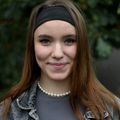A summer internship with a twist: the story of prize-winning student Netta Karjalainen

Netta Karjalainen is a former summer intern at the Department of Applied Physics and currently pursuing a master’s degree in the Theoretical and Computational Methods Program at the University of Helsinki. Last spring, she received her bachelor’s degree in chemistry, and this autumn she won the Global Undergraduate Awards Mathematics and Physics -category for her bachelor’s thesis completed at the University of Helsinki.
The groundwork for her thesis was however completed during her research internship in the Correlated Quantum Materials (CQM) group at the Department of Applied Physics, Aalto University. The winning thesis is entitled “Inferring underlying Heisenberg spin Hamiltonian from a spin spectral function for a quantum spin liquid by a neural network”. A research article based on the thesis work was published in Physical Review Applied in August this year.
Her supervisor at Aalto, Prof. Jose Lado who heads the CQM group explains: “Systems at the atomic level follow quantum mechanics, but in general, we cannot know what the mathematical description is. Experimentally we can measure how currents flow through individual atoms, which is a consequence of the quantum description of them, but we cannot directly extract it.” In the project, Karjalainen successfully applied machine learning to transform measurements of the current directly to such mathematical quantum descriptions. The scientific impact of the work lies in the novelty of the approach, namely applying this methodology to extract mathematical descriptions since solving this problem is extremely challenging to accomplish otherwise.
The benefits of a positive working environment and an unexpected outcome
The project offered Karjalainen a chance to explore machine learning and interesting quantum phenomena at the same time, which were both new topics for her. At the beginning of the project and the writing process, these topics seemed very challenging and hard to comprehend to a beginner. At the same time, this was Karjalainen’s first internship and not the topic of her major which was chemistry- this was in theoretical physics. Luckily, Karjalainen profited from a positive supervision experience and accredits Lado with having both patience and the ability to explain new topics in a comprehensive manner and offer assistance where needed.
Karjalainen then decided to write her bachelor’s thesis about this project since she found the work so fascinating. “I felt that I constantly learned new things and I was encouraged to do my best. When I had finished the thesis and heard about the competition, I immediately knew that I should participate. However, the winning came as a total surprise. I couldn’t have imagined that I could win in an international competition – in a category that was not even my major.” Karjalainen explains further.
Netta KarjalainenI felt that I constantly learned new things and I was encouraged to do my best.

She subsequently travelled to Ireland in November to receive her award and meet other winning students from around the world. “I am glad that I decided to do my internship in the CQM group and participate in the competition. Due to these, I gained new interest in quantum technologies and machine learning, and I also got to meet amazing people” Karjalainen finishes. She currently takes courses both at Aalto and the University of Helsinki which is possible thanks to an agreement between those institutions coordinated by Institute Q, the national Finnish Quantum Institute.
The Department of Applied Physics and also the AScI international summer research programme organized by Aalto University’s School of Science annually host summer student interns. Calls for projects will open in January for completion during the following summer. Interested students can contact Prof. Lado informally by email.
Netta Karjalainen’s internship work was jointly supervised by Jose Lado as well as postdoctoral researcher Adolfo Fumega and doctoral researcher Rouven Koch, both members of the CQM group. Their joint research article can be found under DOI https://doi.org/10.1103/PhysRevApplied.20.024054.
For more information contact


- Published:
- Updated:
Read more news

New technology brings immersive audio to everyone’s pockets
A new type of sound recording technology allows recording of immersive soundscapes with ordinary microphones and an inexpensive accessory
Funding for a democratic transition to sustainability
Three projects from Aalto University are among the recipients. The Nessling Foundation's grants aim to advance the implementation of sustainability transitions in the context of democracy, the EU, and nature conservation areas.
A community where personal connections and career paths intertwine
Assistant professor of operations management Siavash Khajavi explains how studying Industrial Engineering and Management helps students develop hard skills through rigorous studies and soft skills through countless interactions and collaboration.